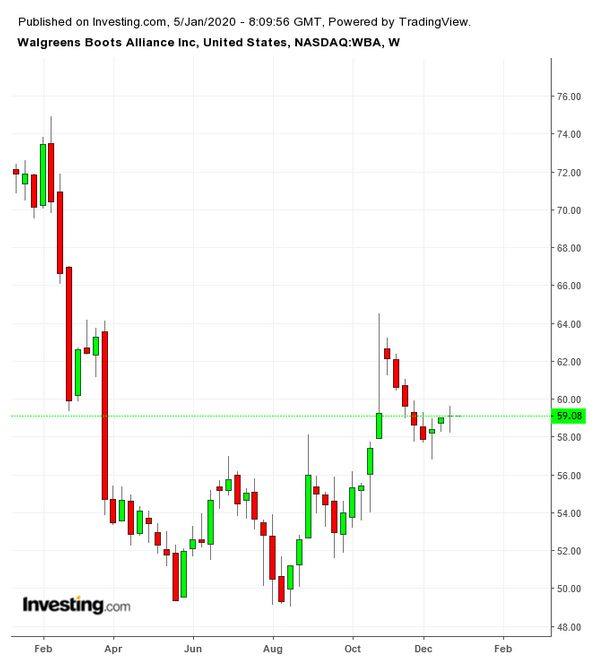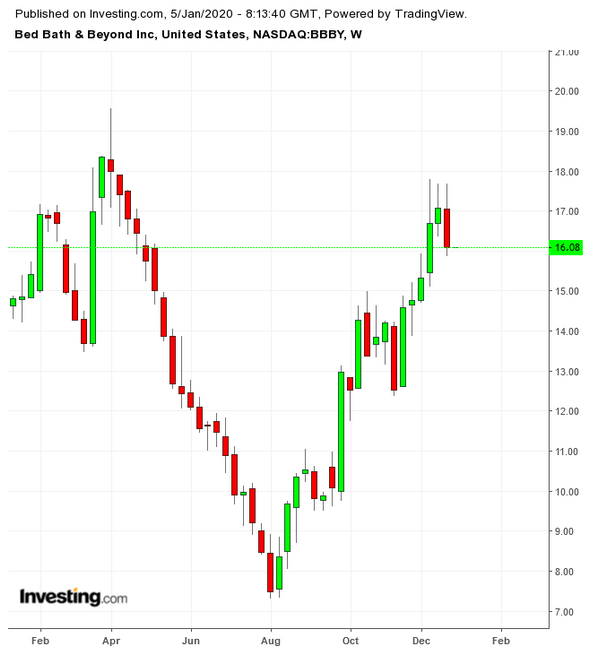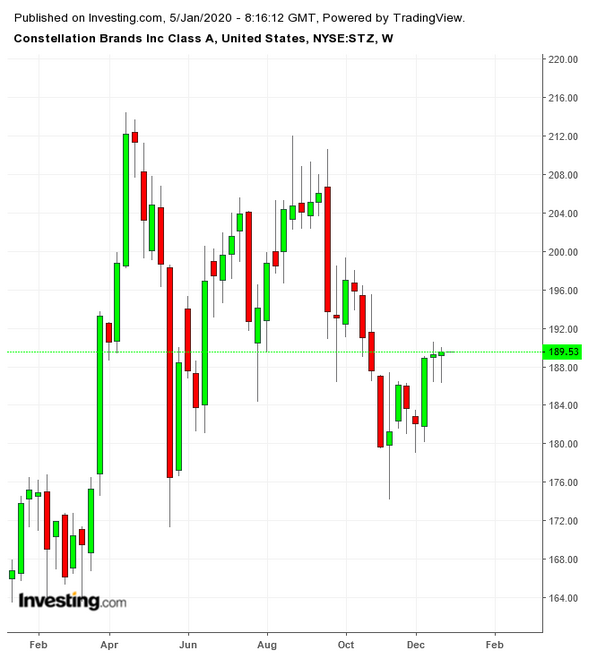
- All Instrument Types
- Indices
- Equities
- ETFs
- Funds
- Commodities
- Currencies
- Crypto
- Bonds
- Certificates
Please try another search

3 Stocks To Watch This Week: Walgreens; Bed, Bath & Beyond; Constellation

There's a new source of volatility confronting investors when the markets resume normal trading on Monday, following the U.S.'s targeted-killing of Iranian military leader Major General Qassem Soleimani in an airstrike in Baghdad on Thursday.
The complex nature of this conflict between the U.S. and Iran, which is a Middle Eastern regional power, makes it hard to predict how it might affect the U.S. economy, which is in a strong growth mode, helping the domestic markets to reach new highs.
Despite economic optimism, stocks are likely to come under pressure—at least in the short-run—after this sharp escalation. The Middle East will be the focal point for next week’s trading.
Some companies, however, will be reporting quarterly earnings in the week to come. We believe these three stocks could see some price swings after they report.
1. Walgreens
Walgreens Boots Alliance (NASDAQ:WBA), the second-largest pharmacy operator in the U.S., will report Q1 earnings on Wednesday, Jan. 8, before the market opens. Analysts expect an EPS of $1.41 a share in the quarter ending November on revenues of $34.6 billion.

The Deerfield, Illinois-based company has been implementing a cost-cutting drive as its market share comes under pressure with growing competition from Amazon (NASDAQ:AMZN) and other players. In October, the drug-seller said it plans to cut another $300 million from its annual costs as it expects growth to flatten in the current fiscal year.
The drug store operator's aim is to streamline its retail operations and prioritize the digital transformation of some functions. The company said in August that it intends to close 200 U.S. locations on top of a previously announced cut of as many as 750 stores.
Adjusted earnings per share will be “roughly flat” in fiscal 2020, Walgreens told investors at that time. Due to these pressures, its shares have massively underperformed the broader market during the past year, falling more than 12%. Shares closed unchanged on Friday at $59.08.
2. Bed, Bath & Beyond
If U.S. consumers continued to spend in the final three months of 2019, as reports of the holiday retail season suggest, then we’re going to see some evidence of this strength when the embattled home furnishing and housewares giant, Bed Bath & Beyond (NASDAQ:BBBY) reports its fiscal Q3 earnings on Wednesday, Jan. 8 after the market close.

Analyst consensus estimates the retailer will report $2.85 billion in sales, while making $0.02 per share profit. The retailer is in the middle of a massive turnaround after failing to revamp its business model in order to survive the onslaught of e-commerce giants.
Last month, the company announced that a half-dozen top executives are leaving the chain, including the heads of merchandising, marketing, digital and legal. Earlier this year, Bed Bath & Beyond replaced several directors, including the chain’s co-founders, amid pressure from activist investors. As well, it has been conducting a strategic review of its portfolio of roughly 1,500 stores.
Encouraged by these efforts, investors have sent BBBY shares higher by more than 50% in the past three months. They closed on Friday at $16.08 after falling 1.5%.
3. Constellation Brands
Also on Wednesday, the U.S.-based producer of Corona beer, Constellation Brands (NYSE:STZ) will come under investor scrutiny when it reports Q3 earnings for the 2020 fiscal year before the opening bell. The Victor, N.Y.-based beer, wine and spirits maker is anticipated to show $1.9 billion in revenue and $1.84 of profit per share.

In the past few quarters, earnings have been pressured by the $4 billion stake the company has in marijuana producer Canopy Growth (NYSE:CGC). The Canadian cannabis company is struggling to show profitability, a challenge faced by other pot producers in the sector.
In the previous quarter, Constellation reported a $525.2 million loss in the second quarter, weighed down by paper losses in its Canopy Growth investment. Its stake in Canopy shrank by about $1.3 billion of value in Q2, including a $839 million decline in Canopy’s share price.
“Canopy’s business is rapidly evolving, and the financial results will likely be volatile,” Constellation’s finance chief, David Klein, told analysts in October. The company’s share price has fallen more than 5% in the past six months. It was up 0.6% on Friday to close at $189.53.
Related Articles

This year tracks as a record for ETF launches among US issuers Investors have demanded high-yield, protection, and crypto-related funds in 2024 New strategies emerge, including...

Not too long ago, we wrote about a potential cup with handle breakout for the market-leading VanEck Semiconductor ETF (NASDAQ:SMH) Today, we examine a “monthly” chart...

Gold stocks are not yet unique within the wider macro, but that does not preclude a move to 40 by GDX (NYSE:GDX).Interestingly, however, on the day this was written (pre-market,...
Are you sure you want to block %USER_NAME%?
By doing so, you and %USER_NAME% will not be able to see any of each other's Investing.com's posts.
%USER_NAME% was successfully added to your Block List
Since you’ve just unblocked this person, you must wait 48 hours before renewing the block.
I feel that this comment is:
Thank You!
Your report has been sent to our moderators for review





Add a Comment
We encourage you to use comments to engage with users, share your perspective and ask questions of authors and each other. However, in order to maintain the high level of discourse we’ve all come to value and expect, please keep the following criteria in mind:
Perpetrators of spam or abuse will be deleted from the site and prohibited from future registration at Investing.com’s discretion.